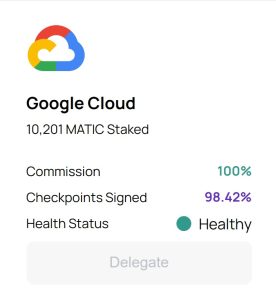
Google Cloud Joins Polygon as Validator in PoS Network
Polygon Labs announced on September 29 that Google Cloud has become a validator for the Polygon proof-of-stake network. Google Cloud joins over 100 other validators in authenticating Ethereum layer-2 transactions.
The partnership was announced via a post from Polygon Labs on the X platform (formerly Twitter):
“The same infrastructure used to power @YouTube and @gmail is now helping to secure the fast, low-cost, Ethereum-for-all Polygon protocol.”
Validators on the Polygon network assist in network security by operating nodes, staking MATIC, and partaking in proof-of-stake consensus mechanisms.
The Google Cloud Singapore account confirmed on X that Google Cloud was now serving as a validator on the Polygon PoS network, adding that it would be contributing to the network’s collective security, governance, and decentralization alongside 100+ other validators.
While the majority of Polygon’s validators are anonymous, Google Cloud has joined one of Europe’s largest telecommunications companies, Deutsche Telekom, on the network.
Google Cloud, for its part, characterizes its partnership with Polygon Labs as “an ongoing strategic collaboration.”

Source: Polygon Staking
Alongside the announcement that it would join the network as a validator, Google Cloud Asia Pacific published a YouTube video titled “Polygon Labs is solving for a Web3 future for all.” Polygon Labs has recently launched “Polygon 2.0” to modernize the Polygon network.
As stated previously, the present phase, “Phase 0,” contains three Polygon Improvement Proposals, PIPs 17–19.
PIP 17 entails the transition from MATIC to the new token POL, whereas PIPs 18 and 19 deal with supporting tasks such as the technical description of POL and the update of gas tokens.
According to Polygon, these modifications will commence in the fourth quarter of 2023.





